Updated: February 6th, 2025
Whether you're facing the GIA (General Intelligence Assessment), PPA (Personal Profile Analysis), or HPTI (High Potential Trait Indicator), preparation is key to boosting your hiring chances. These tests are designed to evaluate your cognitive abilities, personality, and leadership potential—qualities top employers are looking for!
In this guide, you'll discover expert strategies, practice tips, and essential information to help you excel. Ready to gain the edge over other candidates and score higher? Let’s get started!
Here's What Test-Takers Say About Our Thomas International Test Practice!
Not sure which of the Thomas International tests you are required to take? If you are expecting a cognitive test, then you’re probably looking for the GIA test. Personality test? That’ll be the PPA assessment or the HPTI test. If you have an emotional intelligence assessment – look for the TEIQue test.
Which Thomas International Assessment Are You Looking For?
Explore the selection of Thomas International tests below. Discover and learn more about each one.
Thomas Assessments
Thomas International - GIA TestGeneral Intelligence Assessment
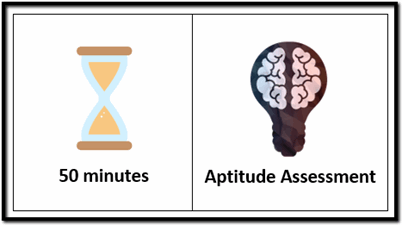
The Thomas International General Intelligence Assessment (GIA) is unlike most common psychometric tests, as it aims to assess your general intelligence, rather than your advanced subject-specific abilities (e.g. numerical, verbal, or abstract reasoning).
To take an in-depth look at the Thomas GIA test, watch the following video:
The goal of the Thomas International General Intelligence Assessment (GIA) is to predict how long you will take to adapt to a new regime when working in your desired job. Your cognitive abilities are also evaluated to assess your leadership skills and problem-solving capabilities. The exam questions are all on the same easy level of difficulty.
For free GIA test and more information >>
The GIA's Test Structure
The GIA test consists of five different intelligence assessments sections:
- Perceptual Speed Section: This section measures your perception of inaccuracies in written material, numbers and diagrams. This test also assesses the ability to ignore irrelevant information, recognise similarities, locate differences and perform error-checking.
- Reasoning Section: This section measures your ability to make inferences and draw accurate conclusions regarding the information provided in the test.
- Number, Speed & Accuracy Section: This section measures your basic numerical reasoning ability.
- Spatial Visualisation Section: This section measures your ability to create and manipulate mental images of objects which are displayed on the exam.
- Word Meaning Section: This section evaluates your word and vocabulary knowledge by assessing how well you can find which word does not belong within a group of words.
Boost Your Hiring Chances by 73% with Our Proven GIA Test Prep!
Join thousands of job seekers who succeeded with the Full PrepPack™.
- 2 GIA–style practice tests & guide
- 8 numeracy practice tests
- 7 verbal comprehension practice tests
- 4 deductive reasoning tests
- 2 error-checking tests
- Detailed explanations, solving strategies and score reports
- Money back guarantee!
Thomas International PPA TestPersonal Profile Analysis
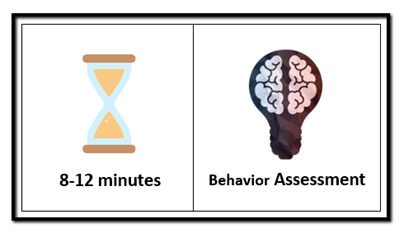
The Thomas International Personal Profile Analysis (PPA) is an 8-12 minutes personality assessment. It provides employers with insight into your workplace behavioural patterns, such as your motivations, communication style, performance under pressure and so on. It serves an important purpose among the Thomas International Tests.
Familiarising yourself with personality tests will help you understand which aspects of yourself need to be emphasised to portray your strengths. Read more about the Thomas International PPA test and learn how practising with JobTestPrep can improve your performance.
Thomas International PPA assessment measures 4 personality characteristics: Dominance, Influence, Steadiness, and Compliance. The four traits being assessed are represented by different words that you are asked to choose from during the test.
Top 5 Tips for the Thomas PPA Assessment
1. Carefully read through the test instructions: Before answering questions on the Thomas International PPA Test, make sure to read through the test instructions slowly and deliberately.
2. Identify words which fall under the four main desired traits: Some words presented in the PPA assessment correspond with the personality traits that the test aims to assess. When you consider the 4 desirable qualities listed above, try to choose words which match these traits.
3. Be consistent with your answers: The assessment may include similar questions which are posted in a different way to tell whether you are giving the answers that you think an employer wants to hear, or if you are being true to your character.
4. Consider the job position you are applying for: When answering test questions, try to consider the role you are looking to fill and what attributes your potential employer would be looking for in an employee.
5. Be yourself: Although you are being assessed on how well you fit the job position, you are also able to make sure the position is the right fit for you. Don’t give answers that simply aren’t a reflection of your personality, because, at the end of the day, you want to succeed in the role you are placed in.
6. You are not only scored according to what you choose but also according to what you DON’T choose.
Boost Your GIA Test Score and Get Hired Faster!
Master every challenge with personalized test prep, expert simulations, and actionable feedback. Get fully prepared to achieve your highest score!
Full-Length Simulations
Practice under real test conditions.
Personalized Insights
Identify and improve your weak areas.
Expert Tips
Refine your answers and maximize your score.
Thomas International TEIQueTrait Emotional Intelligence Questionnaire
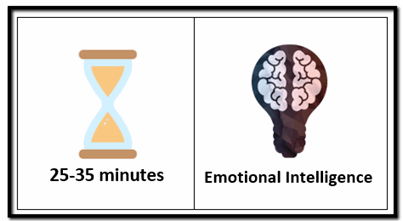
The Thomas International Trait Emotional Intelligence Questionnaire (TEIQue; pronounced as TQ) measures your ability to recognise and control your emotions, as well as deal with the emotions of others. The questionnaire includes statements regarding your responses to different situations, and your task is to rate how strongly you agree or disagree with each statement. This questionnaire usually takes about 25-35 minutes to complete.
Since emotional intelligence allows for self-awareness and adaptability, it is a desired and important trait for employees (and especially managers) to possess in any workplace. This questionnaire displays your communication abilities, your relationship management skills, and the way you deal with stress, conflicts, or any other challenges that may arise in a work environment.
How to Approach the Thomas International TEIQue Assessment?
The TEIQue is used to identify candidates who can thrive in any set of circumstances as well as those who are suited for management roles. For this reason, we advise you to consider the context of your life when answering each statement. Being aware of which aspects of your emotional intelligence are important in your work and personal life can help you determine which traits to emphasise.
Thomas International HPTI: The High Potential Traits Inventory
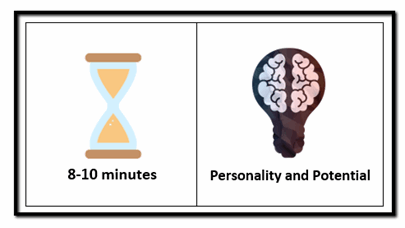
The Thomas HPTI test is used by employers to assess potential candidates to evaluate personality traits that may affect the candidate’s workplace performance.
This unique member of the Thomas International tests contains a large number of questions that must be answered very quickly. This makes it challenging for candidates – the great number of questions and the limited time are designed to create artificial stress on candidates.
In the following guide, you will receive an explanation of the personality traits measured by the Thomas HPTI test, the way in which the test is organized, and the methods used to measure and evaluate the personality traits.
What Is the Thomas HPTI Test?
The Thomas High Potential Trait Indicator (HPTI) assessment is a personality test designed by Thomas, a large multinational company with offices from the United Kingdom to the Netherlands to Dubai to Malaysia to provide employers with psychological assessments of candidates.
The HPTI test is a personality test. It is built on the assumption that every potential candidate has a set of certain personality traits that are more or less stable throughout their career and that these traits can be used to assess candidates in a standardized, computer-based test.
Because the test designers believe that the HPTI test results display qualities that stay with a candidate over the long term, these go into an employee's record, and are used to build long-term plans for a candidate's career. This means it there is a deep importance to doing well in this test that is beyond the immediate acceptance for the current position you're applying for – the test will also affect your chances for promotion going forward.
A big challenge of the Thomas HPTI test is that the questions must be answered very rapidly – you will be given about six seconds to answer each of the questions. This is designed to create stress so that the candidate has less of an opportunity to think about the questions. You can minimize difficulties by preparing for the test so that you are calm when you are taking it.
The Traits
Conscientiousness
Candidates with a high Conscientiousness score are focused on their goals and on finding ways to achieve them. On the other hand, candidates that score lower on the Conscientiousness trait tend to be more open-minded and more open to learning new insights.
Adjustment
A high adjustment score means that the candidate performs better under pressure. Those whose Adjustment score is low tend to experience more workplace stress, and so might be a less than optimal fit for a high-stress working environment.
Curiosity
Candidates with a high Curiosity score are more interested in learning and in trying new ways to achieve workplace goals. On the other hand, low Curiosity scores means the candidate prefers reliable, time-tested methods that achieve consistent results.
Risk Approach
High-scoring candidates tend towards actively confronting difficult situations, whether workplace conversations or high-risk work. On the other hand, those with a lower risk approach demonstrate a more passive or reactive response to risk, which can be a disadvantage in some workplaces and an advantage in others.
Ambiguity Acceptance
A high ambiguity acceptance score means that a candidate is better at dealing with situations that involve uncertainty, ambiguity, or complexity, while a candidate with a low score thrives in situations where situations have clear-cut answers and solutions.
Competitiveness
Candidates with a high competitiveness score enjoy working to reach positions of power, influence, and recognition. On the other hand, persons with a lower score may prefer working out of the spotlight and are often better at collaborating with coworkers, even if this requires them to work as hard as the high-competitiveness candidates.
Sample Question
The HPTI test consists of 78 questions, which the candidate must answer within 8 minutes. (This is intended to ensure that the candidate answers each question as quickly as possible, providing an answer which is 'instinctive'). Each of the questions Is answered on a 1-7 Likert scale, where 1 means 'disagree completely' and 7 means 'agree completely'.
Generally, I avoid making decisions that have a chance of leading to failure.

Test scores
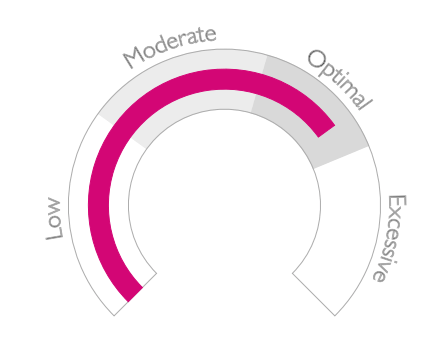
Test scores in the HPTI are ranked from Low through Moderate and Optimal to Excessive. Optimal scores are considered the best, but those candidates with a Moderate score (especially if it is a score close to Optimal) may still be accepted to leadership positions. A Low or Excessive score means that one's senior leadership effectiveness is reduced in certain contexts, but the candidate can still fit for different roles.
How to Study for the Test
It's very clear that the test doesn't include testing any kind of professional or scientific knowledge. On the other hand, you should not believe anyone who tells you that you should not study for this test, or that there are 'no wrong answers' – there are clearly wrong answers, that's why the company paid so much money to commission this test!
The proper way to study for the HPTI is to rehearse, as much as possible, with mock tests that let you simulate answering real HPTI questions in limited time. You should do this again and again until you are confident in getting a good test score.
Thomas International Assessment Centre
In addition to the company's various aptitude and personality tests, Thomas International hosts numerous assessment centre days. The assessment centre is used in the course of the hiring process to make hiring decisions, and after during in-house training. Each evaluation used during the assessment centre stage helps employers assess different aspects of potential employees:
Thomas International Teams and Thomas Diagnostics – This assessment evaluates how well a certain group of people work together as a team.
Thomas International PAC – This assessment provides a more specific, personal evaluation of your talents, key behaviours and abilities as a worker. Its goal is to identify areas that need to be strengthened, people with leadership skills, etc.
Thomas International SaMb – This is a self-awareness and modifying behaviour workshop. It is meant to improve the way employees communicate with one another and adapt to different situations common to the office environment.
When practising for your upcoming Thomas International assessment centre, it is important to notice and accentuate your cognitive abilities, interpersonal skills, and desirable characteristics. Your potential employers will be evaluating you based on your attitude as well as your performance during the assigned tasks, so being aware of your strengths beforehand can help you outdo the competition.
Thomas International Test - FAQ
Thomas International is a test provider which offers both personality assessments and intelligence tests. There are numerous types of Thomas tests, as well as over 100 different test categories found within their Thomas Skills test battery.
The Thomas General Intelligence (GIA) test is used to evaluate candidates’ cognitive capabilities and general intelligence.
The Thomas Personality Profile Assessment (PPA) is a brief questionnaire which poses questions reflecting various day-to-day work scenarios. Your answers are then assessed to predict your behavioural tendencies.
The GIA test provides a report which is scored out of 100 and offers an estimate of test-takers’ general intelligence in regards to how well they mentally process information, concentrate, and respond to training.
DISC is a personality profiling tool which assesses test-takers’ Dominance, Influence, Steadiness and Compliance. These four factors predict one’s everyday behavioural tendencies.
The PPA test is an ipsative assessment, which means that it compares a test-taker’s test answers against their prior performance patterns. This test’s scoring method compares a candidate’s performance to themselves and not to other candidates.
More Free Practice
We at JobTestPrep find the assessment tests world highly diverse and fascinating. If you are looking to deepen your knowledge in the aptitude tests world, or you want some extra practice before your test, we've got you covered!
Check out these fantastic free practice tests (all are completely free):
Free Aptitude Test | Free Psychometric Test | Free Numerical Reasoning Test | Free Verbal Reasoning Test | Free Cognitive Test | Free Critical Thinking Test | Free Abstract Reasoning Test | Free Spatial Reasoning Tets | Free Personality Test | Free Inductive Test | Free Mechanical Reasoning Test




